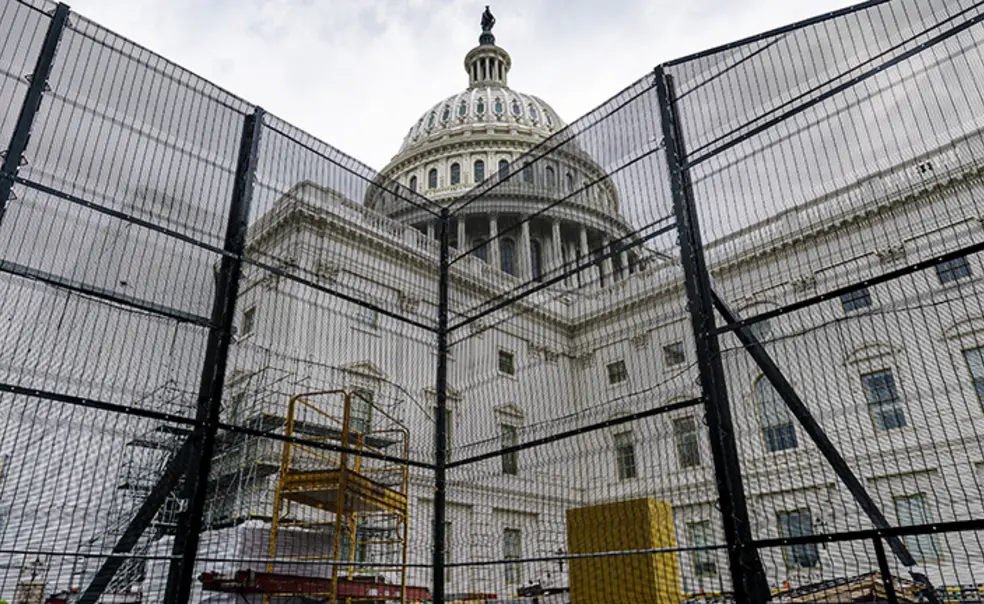Q&A: Law Professor Rick Pildes ’79 on Reforming the Electoral Count Act
‘It would be tragic if the legislation collapsed over any of these issues,’ Pildes says

The Electoral Count Act was enacted to close loopholes that created chaos following the presidential election of 1876, but in 2020 some Republicans tried to exploit alleged ambiguities in its language in a bid to help former president Donald Trump remain in power.
On July 22, a bipartisan group of 16 senators, led by Republican Susan Collins of Maine and Democrat Joe Manchin of West Virginia, introduced legislation to reform the Electoral Count Act as well as an obscure provision in the Presidential Election Day Act that Rick Pildes ’79, a law professor at New York University, has described as “a loaded weapon.” So far, the Collins-Manchin bill has drawn widespread support but also some criticism. Pildes provided informal advice to the group of senators as well as a House committee that has been working on this legislation. Pildes, who has spoken to PAW before about U.S. election law, discussed the Collins-Manchin bill with senior writer Mark F. Bernstein ’83.
Do the Electoral Count Act and other U.S. election laws need to be reformed?
These are the laws that are supposed to provide the stable legal framework for critical aspects of the presidential election process. They establish the relationship between states and Congress in the context of a presidential election, and they regulate how Congress is supposed to act in the joint session that receives the electoral votes from the states. The problem is that two of the main statutes date back to the mid-19th century. The Presidential Election Day Act was enacted in 1845 and the Electoral Count Act in 1887.
The Electoral Count Act, in particular, is not at all transparent in a context in which it is essential that we have clear legal rules that are established in advance. The Presidential Election Day Act contains a provision, known as the “failed election provision,” that could grant a state legislature the power to step in and appoint its own slate of electors even after a popular vote for president had been taken. That is the provision I have referred to as a loaded weapon, because it could be construed to give legislatures dangerous powers in a presidential election.
What is your assessment of the Collins-Manchin bill?
I think it is a vast improvement on the status quo. For one thing, and contrary to what some in the Trump administration argued in 2021, the bill makes clear that the vice president’s role at the joint session of Congress to count the electoral votes is purely ministerial, and that he or she has no authority to decide which electoral votes to accept. It also increases the number of representatives and senators — from one of each to 20 percent of each chamber — who must object to a state’s electoral votes before there is any obligation for Congress to entertain those objections.
Another important thing it does is make clear that states must determine the winner of the election through laws that have been enacted in advance of the election. It also tries to eliminate the possibility that a state might send two different slates of electors to Congress, which was the concern that the original Electoral Count Act was created to deal with. It makes it clear that there is only one legally valid slate of electors from a state and that Congress is bound to accept that slate.
The bill also gets rid of that “failed election” provision and says that, in the extraordinary event that a state cannot hold an election on Election Day because of, let’s say, a natural disaster, the state can hold its election at a later date. But the popular vote still decides who wins the state’s electoral votes. The legislature can’t appoint electors on its own.
Marc Elias, a prominent Democratic election lawyer, has criticized the bill because, among other things, it requires that that each governor must submit a certificate identifying that state’s electors at least six days before the Electoral College meets, and says that this certificate shall be “conclusive” in determining whose electors Congress should count. Elias worries that this language would bar courts from intervening if a rogue governor submitted electors for a candidate who did not win the popular vote in that state. What do you think?
That is a misunderstanding of what the proposed legislation does. If a governor refuses to send the slate of electors that has been determined to be the legally valid slate or if the governor tries to send in something different than what has been legally certified as the correct outcome in that state, that can be challenged in federal court, with a direct appeal to the Supreme Court. If the federal court orders the certificate to be modified, Congress must accept that decision.
How do you respond to Elias’s argument that six days is not enough time for judicial review if a case goes to court?
I have no objection to extending that time, if there’s bipartisan support for doing so. There are other modest changes in the bill that might improve it, but I think it's important not to miss the larger point. It’s extremely significant that there be bipartisan support for these reforms, not just because you need 60 votes in the Senate to overcome the filibuster but because the statute is self-enforcing in Congress. Both parties have to buy into it because that is the only way it will work. Once the joint session of Congress convenes, the courts are out of the picture. So, while there are modifications to the Collins-Manchin bill that I would be happy to support if they had significant bipartisan support, in my opinion they are not dealbreakers. There is bipartisan support for the Collins-Manchin bill as it is currently written, and it would be tragic if the legislation collapsed over any of these issues.
Some legal scholars have argued that the entire Electoral Count Act is unconstitutional. What do you think?
I disagree. Article II of the Constitution assigns Congress the power to receive and count the votes, and the “Necessary and Proper” clause gives Congress the power to implement that provision. The Act is essentially a set of procedural mechanisms for managing the process the Constitution assigns to Congress.
On top of that, the way that this works in practice is that, at the start of the joint session, each house chooses to adopt the rules in the Electoral Count Act to govern that joint session. In other words, Congress voluntarily agrees to use these rules. So, the question of whether the statute is constitutional doesn’t come into play unless there are members of Congress who do not want to abide by Congress’ commitment to handle the process according to these rules. As long as Congress agrees to be bound by these rules, that’s what really matters.
The Supreme Court has agreed to hear a case this term from North Carolina, Moore v. Harper, that some observers believe could lead the justices to embrace something called the “independent state legislature theory” and curtail the ability of courts to interfere in legislative decisions concerning election law. Could that affect any changes to the Electoral Count Act?
No. The Constitution expressly gives Congress the power to determine the time at which electors are chosen, and Congress has said that date is the first Tuesday after the first Monday in November — in other words, on Election Day. It sometimes takes a while to determine who received more votes, but a legislature can’t appoint electors after Election Day and the independent state legislature theory, even if the Court adopts it, can’t change that. Furthermore, even if a legislature tried to insert itself into the vote counting, the Constitution, and the Court’s decision in Bush v. Gore, require that all ballots be treated equally and fairly, consistent with equal protection and due process.
Do you share the sense of urgency that this issue has to be resolved by the end of the current Congress?
I think it’s extremely important that Congress pass a new, modern Electoral Count Act. The closer you get to the presidential election cycle, the more difficult it might become to do that. So, yes, I certainly think the sooner the better.
Interview conducted and condensed by M.F.B. ’83










No responses yet